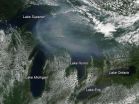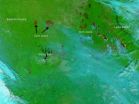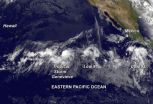(Press-News.org) Canadian wildfires have been raging this summer and some of the smoke from those fires is drifting downward into the U.S. In this image collected by the Moderate Resolution Imaging Spectroradiometer (MODIS) aboard the Aqua satellite on July 24, 2014 a swath of smoke has descended over the Great Lakes region of the United States. What is particularly interesting is the fire image from July 23, 2014 (first image feature highlighted below) clearly shows the path of the smoke as it drifts off southeastward. In the image, it is over Manitoba and parts of Ontario, and by the time this image was taken by Aqua, it had drifted across the Great Lakes.
There have been quite a few image features on NASA.gov recently highlighting the Canadian fires:
Smoke From Northern Territories Fires in Canada - July 24, 2014
Fires in the Northern Territories July 2014 - July 23, 2014
Fires and Smoke in Canada's Northern Territories - July 21, 2014
Wildfires in Canada's Northern Territories - July 15, 2014
Northwest Territories, Canada Wildfires - July 07, 2014
INFORMATION:
NASA image courtesy Jeff Schmaltz, MODIS Rapid Response Team. Caption: NASA/Goddard, Lynn Jenner
Smoke from Canadian fires hover over Great Lakes
2014-07-25
ELSE PRESS RELEASES FROM THIS DATE:
Slow walking speed and memory complaints can predict dementia
2014-07-25
July 25, 2014—(BRONX, NY)—A study involving nearly 27,000 older adults on five continents found that nearly 1 in 10 met criteria for pre-dementia based on a simple test that measures how fast people walk and whether they have cognitive complaints. People who tested positive for pre-dementia were twice as likely as others to develop dementia within 12 years. The study, led by scientists at Albert Einstein College of Medicine of Yeshiva University and Montefiore Medical Center, was published online on July 16, 2014 in Neurology®, the medical journal of the American Academy ...
Scalping can raise ticket prices
2014-07-25
Scalping gets a bad rap. For years, artists and concert promoters have stigmatized ticket resale as a practice that unfairly hurts their own sales and forces fans to pay exorbitant prices for tickets to sold-out concerts. But is that always true?
A new study by Victor Bennett, assistant professor of management and organization at the USC Marshall School of Business, along with colleagues at New York University and the Harvard Business School, finds that resale markets like Craigslist can add value to tickets sold by concert venues and Ticketmaster. "Cannibalization and ...
Burn scars in Eastern Russia
2014-07-25
The burn scars on this false-color image from the Terra satellite show the different areas that have been affected by this year's rash of wildfires in Eastern Russia. The burn scars show up as reddish-brown splotches of color against the green background. The wildfires have broken across the remote parts of Eastern Russia in the Sakha Republic. Even in this false-color image from the MODIS instrument, it is still possible to see the smoke rising from the fires that continue. Two recent image features noted below show the devastating number of fires that have plagued ...
Anti-inflammatory drug can prevent neuron loss in Parkinson's model
2014-07-25
An experimental anti-inflammatory drug can protect vulnerable neurons and reduce motor deficits in a rat model of Parkinson's disease, researchers at Emory University School of Medicine have shown.
The results were published in the Journal of Parkinson's Disease.
The findings demonstrate that the drug, called XPro1595, can reach the brain at sufficient levels and have beneficial effects when administered by subcutaneous injection, like an insulin shot. Previous studies of XPro1595 in animals tested more invasive modes of delivery, such as direct injection into the brain.
"This ...
New EMS system in Arizona dramatically improves survival from cardiac arrest
2014-07-25
WASHINGTON -- A new system that sent patients to designated cardiac receiving centers dramatically increased the survival rate of victims of sudden cardiac arrest in Arizona, according to a study published online yesterday in Annals of Emergency Medicine.
"We knew lives would be saved if the hospitals implemented the latest cutting edge guidelines for post-cardiac arrest care and we were able to get cardiac arrest patients to those hospitals, similar to what is done for Level 1 trauma patients," said lead study author Daniel Spaite, MD, Director of EMS Research at the ...
Tropical Storm Genevieve forms in Eastern Pacific
2014-07-25
The seventh tropical depression of the Eastern Pacific Ocean formed and quickly ramped up to a tropical storm named "Genevieve." NOAA's GOES-West satellite captured an infrared image of the newborn storm being trailed by two other areas of developing low pressure to its east.
The National Hurricane Center (NHC) noted that Tropical Storm Genevieve was born on July 25 at 5 a.m. EDT. At that time, Genevieve had maximum sustained winds near 40 mph (65 kph). It was located near 12.2 north latitude and 134.4 west longitude, about 1,490 miles (2,400 km) east-southeast of South ...
Climate change increases risk of crop slowdown in next 20 years
2014-07-25
BOULDER -- The world faces a small but substantially increased risk over the next two decades of a major slowdown in the growth of global crop yields because of climate change, new research finds.
The authors, from Stanford University and the National Center for Atmospheric Research (NCAR), say the odds of a major production slowdown of wheat and corn even with a warming climate are not very high. But the risk is about 20 times more significant than it would be without global warming, and it may require planning by organizations that are affected by international food ...
Whitehead Institute researchers create 'naïve' pluripotent human embryonic stem cells
2014-07-25
CAMBRIDGE, Mass. (July 24, 2014) – For years, researchers and patients have hoped that embryonic stem cells (ESCs)—capable of forming nearly any cell type in the body—could provide insight into numerous diseases perhaps even be used to treat them. Yet progress has been hampered by the inability to transfer research and tools from mouse ESC studies to their human counterparts, in part because human ESCs are "primed" and slightly less plastic than the mouse cells.
Now Thorold Theunissen, Benjamin Powell, and Haoyi Wang, who are scientists in the lab of Whitehead Institute ...
Scientists test nanoparticle 'alarm clock' to awaken immune systems put to sleep by cancer
2014-07-25
(Lebanon, NH, 7/25/14) — Researchers at Dartmouth-Hitchcock Norris Cotton Cancer Center are exploring ways to wake up the immune system so it recognizes and attacks invading cancer cells. Tumors protect themselves by tricking the immune system into accepting everything as normal, even while cancer cells are dividing and spreading.
One pioneering approach, discussed in a review article published this week in WIREs Nanomedicine and Nanobiotechnology, uses nanoparticles to jumpstart the body's ability to fight tumors. Nanoparticles are too small to imagine. One billion ...
Clearing cells to prevent cervical cancer
2014-07-25
Boston, MA – A study published online in the International Journal of Cancer earlier this month describes a novel approach to preventing cervical cancer based on findings showing successful reduction in the risk of cervical cancer after removal of a discrete population of cells in the cervix.
The findings come from a study that looked at squamocolumnar junction cells, or SCJ cells. These cells reside in the cervical canal and have been implicated as the origins of cervical cancer. A research team co-led by Christopher Crum, MD, director, Brigham and Women's Hospital ...



